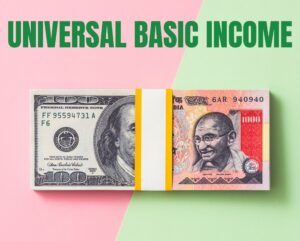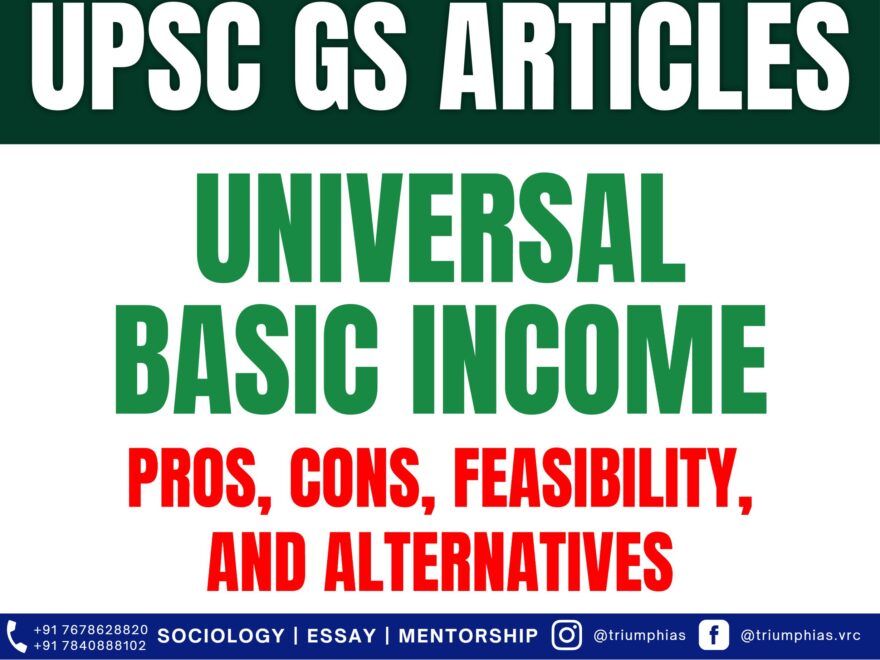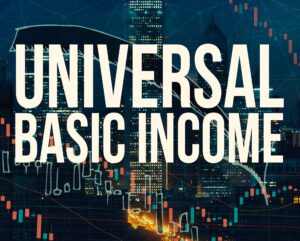Universal Basic Income (UBI)
(Relevant for General Studies Prelims and Mains)

The idea of implementing a universal basic income (UBI) continues to persist, refusing to fade away. While former Chief Economic Advisor (CEA) Arvind Subramanian found it to be a “conceptually appealing idea” in the 2016-17 Economic Survey, the current CEA, V Anantha Nageswaran, has dismissed it, deeming it unnecessary for the country. Interestingly, a recent report on inequality, commissioned by the Economic Advisory Council to the prime minister, also endorsed the concept of UBI. Furthermore, a member of NITI Aayog expressed support for providing a quasi-universal basic income specifically targeting rural areas.
Contrary to these views, the present CEA firmly believes that a UBI is superfluous, asserting that India should prioritize economic growth to fulfill the aspirations of its people. In his opinion, UBI should not even be on the agenda in the foreseeable future.
Universal Basic Income (UBI) entails the provision of a consistent and assured income to all individuals as a fundamental aspect of social welfare. This income is provided without any strings attached or eligibility criteria, aiming to address poverty and serve as a substitute for existing need-based social programs that often involve complex administrative procedures. The overarching objective of UBI is to ensure that every individual, or at least a substantial portion of the population, receives financial support unconditionally or with minimal requirements.

Pros and cons of UBI
Pros
- Poverty Eradication: Mitigates the devastating impact of poverty and narrows the gap between income levels by establishing a guaranteed minimum income for all, with a particular focus on the most vulnerable and marginalized populations. This ensures that even the most disadvantaged individuals have access to essential resources like food, healthcare, education, and housing.
- Health Empowerment: Catalyzes a profound improvement in both physical and mental well-being by alleviating the stress, anxiety, and depression that often accompany financial insecurity and poverty. Furthermore, it enables individuals to afford better healthcare services, sanitation facilities, and proper nutrition, thereby fostering a healthier population.
- Simplified Welfare Structure: Effortlessly simplifies the complex web of targeted social assistance programs by replacing them with a unified system. This streamlined approach reduces administrative burdens, slashes costs, and eliminates the intricate procedures associated with means-testing, eligibility requirements, and abrupt termination of benefits.
- Enhanced Personal Autonomy: Bestows individuals with profound financial security, granting them the liberty to make choices regarding their employment, education, and personal lives. UBI empowers people to pursue their passions, explore entrepreneurial endeavors, and engage in creative or socially impactful pursuits that may otherwise be hindered by financial constraints.
- Economic Revitalization: Injects a direct infusion of funds into the hands of individuals, acting as a potent stimulus for consumer spending and propelling economic growth. This surge in spending invigorates local businesses, generates demand for goods and services, and consequently sparks a surge in employment opportunities. UBI also fosters an entrepreneurial spirit, encouraging risk-taking and the pursuit of innovative ventures that may not be economically feasible otherwise.

Cons
- Cost and Fiscal Sustainability: UBI is very expensive and would require higher taxes, spending cuts, or debt to finance it. It could also create inflation, distort the labor market, and reduce economic growth.
- Creates Perverse Incentives: Decreases motivation to work and reduces productivity and efficiency. It could also create a culture of dependency, entitlement, and laziness. It could also discourage people from acquiring skills, education, and training.
- The current Chief Economic Advisor has objected to UBI as it creates “perverse incentives” in dissuading people from making their own efforts to seek income-generating opportunities.
- Inflationary Pressures: It could contribute to inflationary pressures. If everyone receives a fixed amount of money, it may drive up prices for goods and services as businesses adjust their pricing strategies to capture the additional income available in the market.
- Potential for Dependency: UBI may create a reliance on government support, and there is a risk that some individuals might become complacent or dependent on the basic income, leading to reduced motivation for personal and professional growth.
Non Feasibility of UBI For India
- India’s political landscape is characterized by its intricate and multifaceted nature, encompassing various tiers of governance, a plethora of political parties, and diverse interest groups. Within this complex framework, garnering unanimity and backing for UBI can prove to be a formidable challenge. It necessitates navigating the divergent perspectives of key stakeholders, including politicians, bureaucrats, beneficiaries, and taxpayers.
- Furthermore, the implementation of UBI may encounter resistance from individuals who currently benefit from the prevailing welfare programs or those who staunchly oppose any form of redistribution based on ideological principles. These factions may vehemently oppose the notion of UBI, impeding its progress and necessitating a delicate balance between competing interests and values.
- India grapples with numerous formidable obstacles when it comes to effectively and efficiently delivering public services and transfers. The challenges span a wide range, encompassing concerns related to identification, targeting, delivery, monitoring, and accountability. These critical areas significantly impact the overall quality and extent of the existing programs, posing considerable hurdles to their successful implementation.
Alternatives
- QUBRI stands for Quantitative Universal Basic Rural Income, a modified version of the universal basic income (UBI) concept.
- It refers to a transfer of funds that is provided universally, unconditionally, and in the form of cash.
- This proposal was put forward by a former Chief Economic Adviser with the aim of directly transferring Rs 18,000 per year to every rural household in India, excluding those that can be considered financially well-off, in order to address the challenges faced in the agricultural sector.
- The emphasis should be on fostering greater opportunities and empowering individuals to actively engage in and make meaningful contributions to the economy and society, rather than solely relying on a predetermined cash transfer. Inclusive development also aims to tackle the underlying factors that perpetuate poverty and marginalization, including discrimination, limited access to education, healthcare, infrastructure, and social safety nets.
To master these intricacies and fare well in the Sociology Optional Syllabus, aspiring sociologists might benefit from guidance by the Best Sociology Optional Teacher and participation in the Best Sociology Optional Coaching. These avenues provide comprehensive assistance, ensuring a solid understanding of sociology’s diverse methodologies and techniques.
Universal Basic Income, UBI, pros and cons of UBI, poverty eradication, health empowerment, simplified welfare structure, enhanced personal autonomy, economic revitalization, cost and fiscal sustainability, perverse incentives, inflationary pressures, potential for dependency, feasibility of UBI in India, alternatives to UBI, QUBRI, inclusive development, Best Sociology Optional Teacher, Best Sociology Optional Coaching, Sociology Optional Syllabus


